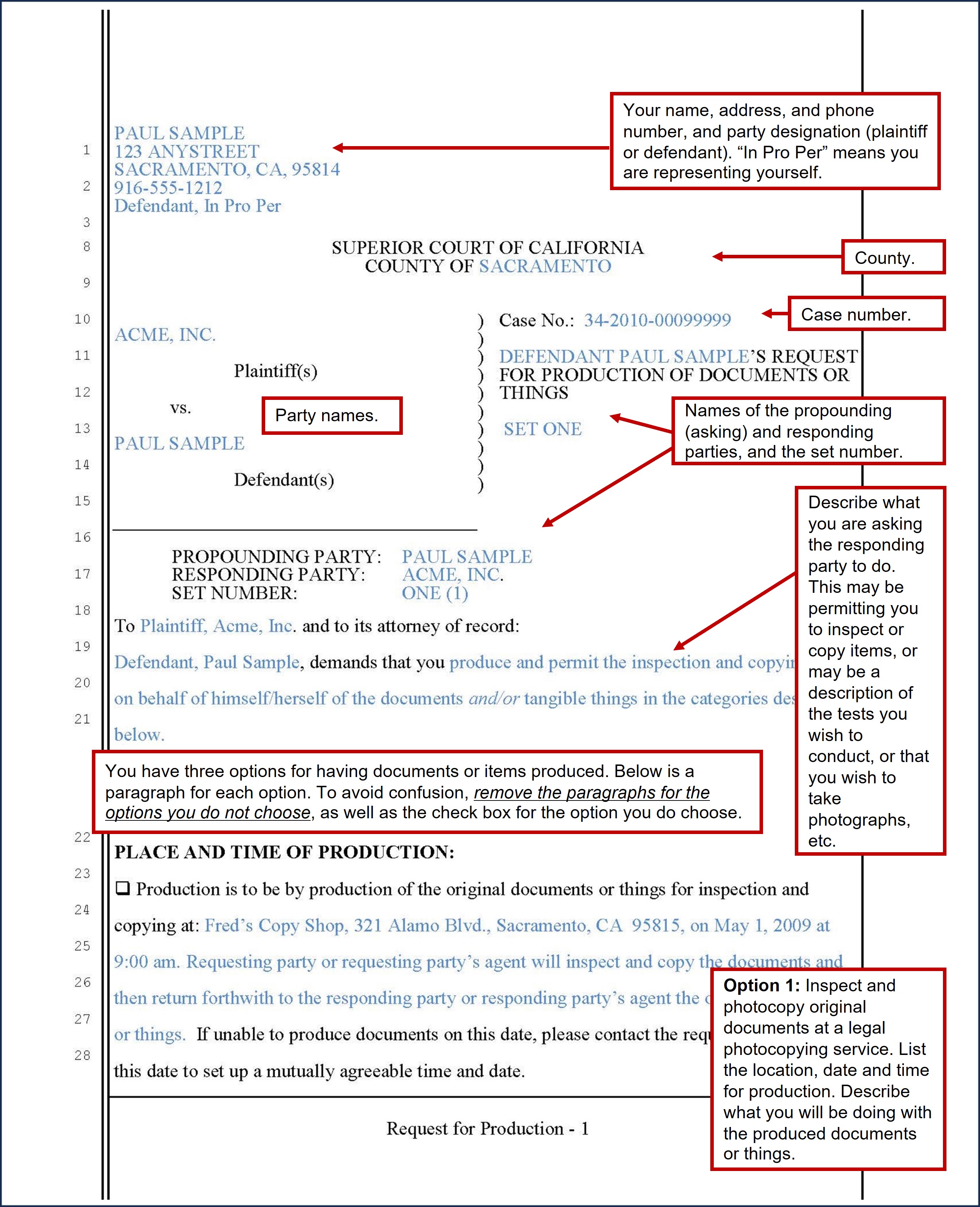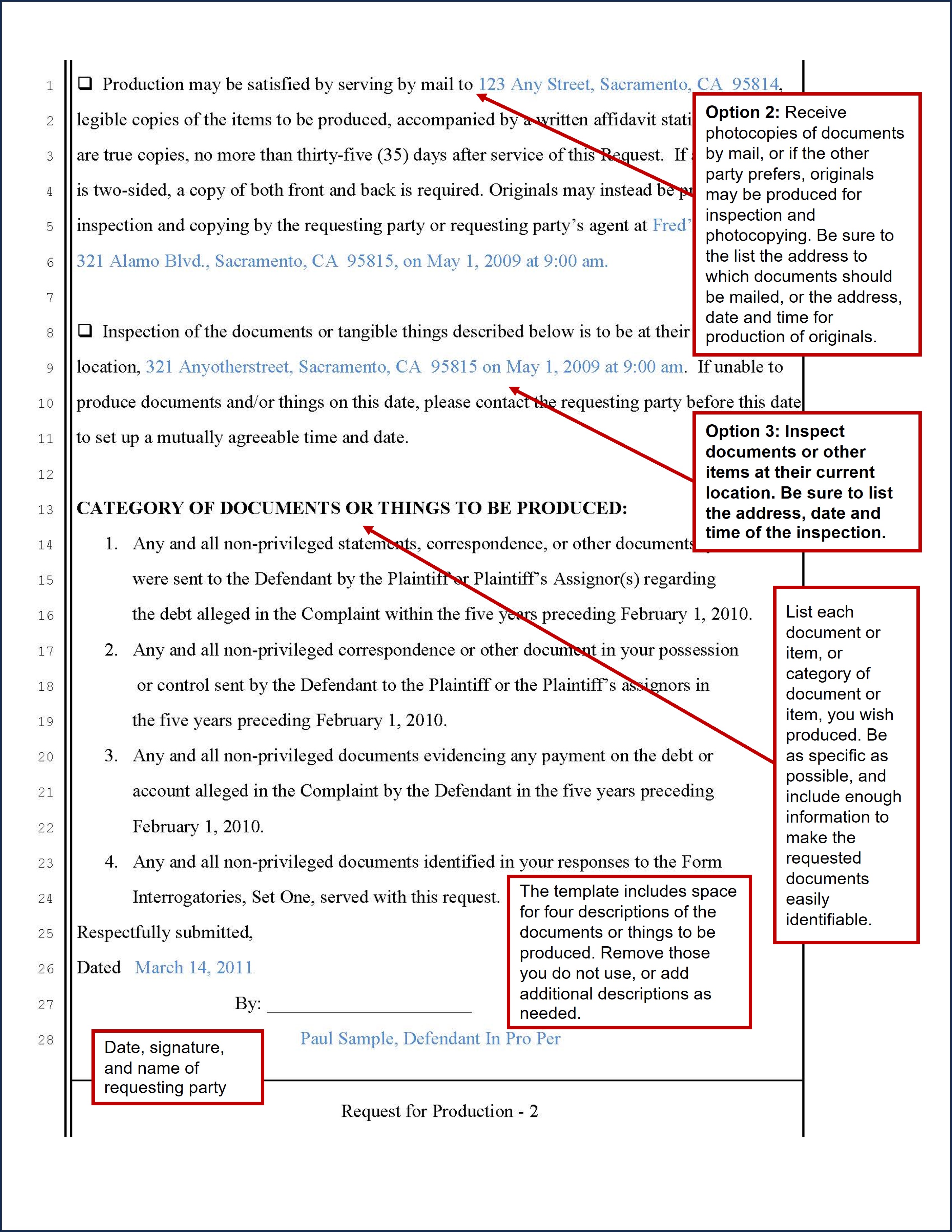Discovery: Request for Production of Documents and Things
Obtain Documents and Things from the Other Party
Requests for production may be used to inspect and copy documents or tangible items held by the other party. Generally, a request for production asks the responding party to make available the original documents, but a requesting party may permit photocopies of the requested documents be sent instead, if inspection of the original document is not necessary. Requests for production can also be used to test, measure, photograph, etc., physical evidence in the other party’s possession or control.
Templates and Forms
California law places strict limits on the number of discovery requests a party can make. In a limited civil case (cases less than $25,000, or $35,000 if filed after Jan. 1, 2024) you may ask each party only 35 questions total, whether they are form interrogatories, special interrogatories, requests for admission, or requests for production.
Keep this limit in mind when writing your requests, to ensure that you are able to obtain all the information you’ll need for your case. If you ask the other party to produce 35 types of documents, you will not be able to serve any interrogatories or request any admissions. If you determine that you cannot obtain all the necessary information in 35 requests, you must file a motion with the court asking for permission to propound more discovery requests (California Code of Civil Procedure (CCP) § 95), or may even request that the court remove the case from the discovery restrictions of a limited civil case altogether (CCP § 91). See the sources listed at the end of this Guide for more information.
In an unlimited civil case (cases for more than $25,000, or $35,000 if filed after Jan. 1, 2024), each party may make an unlimited number of requests for production. These requests, like the requests in a limited civil case, must all be reasonably calculated to lead to the discovery of relevant, admissible evidence. If the number of demands made by the requesting party are abusive, the responding party may file a motion requesting a protective order (CCP § 2031.060).
Step-by-Step Instructions
1
Complete Your Requests for Production
There is no fill-in-the-blanks form for your requests. Instead, you must write your own requests on pleading paper. A sample is at the end of this Guide. You may download a customizable template for your requests from this link:
The template provides language for each of the manners in which you may inspect the documents or things requested. To avoid confusion, remove the paragraphs for the options you do not choose.
Inspect and photocopy original documents at a legal photocopying service. Choose this option if it is important that you inspect the original documents. You will need to list the location, date and time for production. Select a date at least 30 days after service of your request (35 days, if served by mail within California), and a reasonable location that will permit you to inspect, photocopy or test the items in the presence of the responding party or his or her representative.
Receive photocopies of documents by mail. If it is not important that you inspect the original documents, this option can be convenient. Keep in mind that this option is being offered as a courtesy to the responding party. The responding party may produce the originals at the reasonable time and date specified instead of mailing photocopies, especially if photocopying the documents would be burdensome. So, when choosing this option, you will need to list both the address to which photocopied documents should be mailed, or the address, date, and time for production of originals. Select a date at least 30 days after service of your request (35 days, if served by mail within California), and a reasonable location that will allow you to you to inspect, photocopy or test the items in the presence of the responding party or his or her representative, such as a legal photocopying service.
Inspect the documents or things at their current location. This option is useful if you need to inspect a premises or large items that are difficult to move. Be sure to list the address, date and time of the inspection. Select a date at least 30 days after service of your request (35 days, if served by mail within California).
Many litigants prefer to set the date of production later than 30 or 35 days. This way, the propounding (requesting) party will have the responding party’s written responses in advance of the production date. The propounding party then knows what documents and things will be available for photocopying, testing, etc., on the date of production, and will also have the opportunity to attempt to work out any minor discovery disputes or misunderstandings informally, prior to the actual production.
2
Make Copies
Make one photocopy of your requests for each party (other than you) in the case.
3
Have Your Requests Served
A photocopy of your requests must be served on the attorney for the responding party or directly to the responding party if he or she is self-represented (in pro per). Courtesy copies should be served on all other attorneys or self-represented parties in the case. Service may be completed by mail, by a person over the age of 18 who is not a party to the case. The person serving your requests must complete a Proof of Service by First Class Mail (POS-030). For more information, see our guide on Proof of Service by Mail.
4
Retain Your Originals
Your original requests for production and signed proof of service should be retained for your records. If the other party does not respond to your requests, you may use these documents to support a motion to have the court compel the other party to produce the requested documents. For more information, see our guide on Motions to Compel.
For More Information
On the Web
Introduction to Discovery – Part 8: Propounding Requests for Production
Part 8 of this video series from the Sacramento County Public Law Library’s Civil Self Help Center will help you understand what Requests for Production are, and how to propound these types of requests.
In the Law Library
California Civil Discovery KFC 1020 .H64
Electronic Access: On the Law Library’s computers, using Lexis Advance.
California Civil Discovery Practice KFC 1020 .C35
Electronic Access: On the Law Library’s computers, using OnLaw.
California Civil Litigation and Discovery KFC 995 .G674
California Deposition and Discovery Practice KFC 1020 .D44
Electronic Access: On the Law Library’s computers, using Lexis Advance.
California Discovery Citations KFC 1020 .F56
California Practice Guide: Civil Procedure Before Trial KFC 995 .W45
Samples


This material is intended as general information only. Your case may have factors requiring different procedures or forms. The information and instructions are provided for use in the Sacramento County Superior Court. Please keep in mind that each court may have different requirements. If you need further assistance consult a lawyer.




